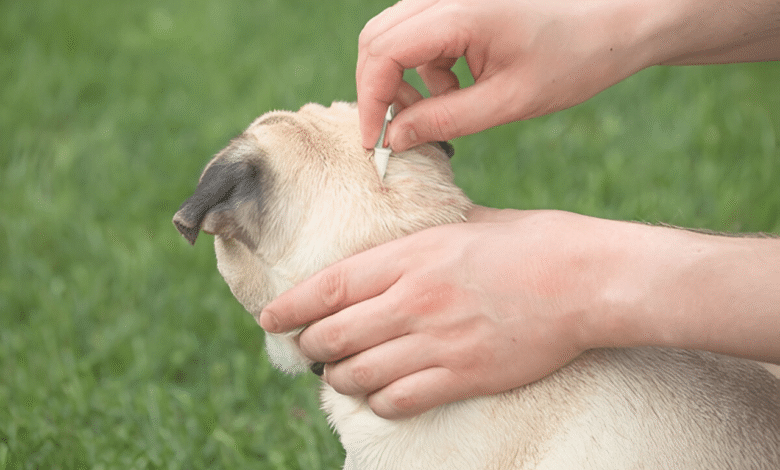
12 Common Pet Parasites and How to Prevent Them
Pet parasites threaten your furry friend's health. Discover 12 common parasites in dogs & cats and learn how to prevent them effectively.
Pet parasites are a common yet serious threat to the health and well-being of our furry companions. These unwanted invaders, ranging from external pests like fleas and ticks to internal worms such as heartworms and roundworms, can cause discomfort, illness, and even life-threatening conditions if left untreated. As a pet owner, being aware of the most common pet parasites and understanding how to prevent them is essential for keeping your pet happy and healthy. This guide will explore 12 of the most prevalent parasites, their symptoms, and effective prevention strategies to safeguard your pet’s health.
Beyond causing irritation and disease, pet parasites can also pose risks to humans, making prevention crucial for the entire household. Some parasites, like ticks and certain intestinal worms, can be transmitted from pets to people, highlighting the importance of proactive care. By implementing regular Pet Parasites prevention measures such as vet-recommended treatments, proper hygiene, and environmental control you can significantly reduce the risk of infestations. Whether you have a dog, cat, or another beloved pet, this comprehensive guide will provide the knowledge you need to protect them from harmful parasites.
12 Common Pet Parasites and How to Prevent Them
Fleas
Fleas are tiny, wingless insects that feed on your pet’s blood, causing itching, irritation, and allergic reactions. These pests multiply rapidly and can infest your home if not controlled. Symptoms include excessive scratching, red skin, and flea dirt (black specks) in the fur. Severe infestations can lead to anemia, especially in young pets. To prevent fleas, use monthly flea treatments, such as topical solutions, oral medications, or flea collars. Regularly wash your pet’s bedding and vacuum your home to eliminate flea eggs and larvae.
Ticks
Ticks are external Pet Parasites that attach themselves to your pet’s skin, feeding on blood and transmitting dangerous diseases like Lyme disease and Rocky Mountain spotted fever. These parasites are commonly found in grassy or wooded areas. Check your pet for ticks after outdoor activities, especially around the ears, neck, and paws. Tick prevention includes using vet-approved tick repellents, tick collars, and keeping your yard trimmed. If you find a tick, remove it carefully with tweezers to avoid leaving the head embedded.
Heartworms
Heartworms are deadly parasites transmitted through mosquito bites. They grow inside the heart and lungs, leading to heart failure and lung disease. Symptoms include coughing, fatigue, and weight loss. Since treatment is risky and expensive, prevention is key. Administer monthly heartworm preventatives prescribed by your vet and minimize mosquito exposure by keeping pets indoors during peak mosquito activity.
Roundworms
Roundworms are intestinal Pet Parasites commonly found in puppies and kittens. They can cause digestive issues, bloating, and stunted growth. Pets can contract them through contaminated soil or their mother’s milk. Symptoms include vomiting, diarrhea, and a pot-bellied appearance. Regular deworming and maintaining good hygiene help prevent infestations. Always pick up pet waste promptly to reduce environmental contamination.
Hookworms
Hookworms are small, blood-sucking worms that attach to the intestinal lining, leading to anemia and weakness. Pets can get infected through skin contact or ingesting contaminated soil. Signs include pale gums, bloody stools, and weight loss. Prevent hookworms by keeping your pet’s living area clean and using Broad-spectrum antibiotic as recommended by your vet.
Tapeworms
Tapeworms are flat, segmented worms that live in the intestines. Pets usually get them by ingesting infected fleas or rodents. Symptoms include rice-like segments in feces or around the anus, along with weight loss. Flea control is essential to prevent tapeworms, as fleas are a common intermediate host. Regular deworming and keeping your pet free from fleas will minimize the risk.
Whipworms
Whipworms reside in the large intestine, causing chronic diarrhea, weight loss, and dehydration. They are highly resilient and can survive in the environment for years. Preventing whipworms involves routine fecal exams and maintaining a clean living space. Since they are difficult to eliminate, consistent deworming and proper sanitation are crucial.
Ear Mites
Ear mites are microscopic Pet Parasites that infest a pet’s ear canal, leading to intense itching, head shaking, and dark, crusty discharge. They are highly contagious among pets. Regular ear cleaning and vet-approved ear mite treatments can help prevent infestations. If one pet is infected, treat all pets in the household to avoid spreading.
Mange Mites
Mange is caused by microscopic mites that burrow into the skin, leading to severe itching, hair loss, and infections. Sarcoptic mange is highly contagious, while demodectic mange is linked to weakened immune systems. Treatment involves medicated shampoos, topical ointments, and oral medications. Keeping your pet healthy with a balanced diet and regular vet check-ups helps prevent mange.
Giardia
Giardia is a protozoan parasite that affects the intestines, causing diarrhea, vomiting, and dehydration. Pets contract it through contaminated water or feces. Prevent giardia by providing clean drinking water and avoiding stagnant ponds. Regular fecal testing and proper hygiene reduce the risk of infection.
Coccidia
Coccidia are single-celled parasites that infect the intestines, leading to watery diarrhea, especially in young pets. They spread through contaminated feces. Sanitation is critical clean litter boxes and kennels frequently. Some preventive medications can help, especially in high-risk environments like shelters.
Lice
While less common than fleas or ticks, lice can still infest pets, causing intense itching, skin irritation, and hair loss. These tiny, wingless insects cling to a pet’s fur and feed on skin debris or blood, depending on the species. Unlike fleas, lice are species-specific, meaning dog lice won’t spread to cats or humans, and vice versa. Infestations often occur in pets with poor hygiene or weakened immune systems, particularly in crowded environments like shelters. Symptoms include excessive scratching, a dry or scruffy coat, and visible white nits (eggs) attached to hair shafts.
Read More: Is Your Cat Bored? 9 Easy Enrichment Ideas That Work
Conclusion
Pet parasites pose a constant threat to our furry companions, but with proper knowledge and preventative care, their risks can be significantly minimized. By staying vigilant about common pet parasites like fleas, ticks, heartworms, and intestinal worms, you can protect your pet from discomfort and serious health complications. Regular veterinary check-ups, year-round parasite prevention medications, and maintaining a clean environment are essential steps in keeping these pests at bay. Remember, prevention is always easier and more cost-effective than treating an established infestation or parasite-related illness.
Ultimately, your pet’s health and happiness depend on your commitment to parasite prevention. Whether through topical treatments, oral medications, or simple hygiene practices, every precaution makes a difference. By implementing the strategies discussed in this guide, you’re not just safeguarding your pet—you’re also protecting your family from potential zoonotic risks. Stay proactive, consult your veterinarian regularly, and enjoy peace of mind knowing you’re providing the best defense against pet parasites for your beloved companion.
FAQs
How often should I deworm my pet?
Puppies and kittens should be dewormed every 2-3 weeks until 12 weeks old, then monthly. Adult pets need routine deworming every 3-6 months.
Can humans get Pet Parasites?
Yes, some Pet Parasites like roundworms and hookworms can infect humans. Practice good hygiene and wash hands after handling pets.
What’s the best flea treatment for dogs?
Topical solutions, oral medications, and flea collars are effective. Consult your vet for the best option for your pet.
Are natural Pet Parasites preventatives effective?
Some natural remedies help, but they may not be as reliable as vet-approved medications. Always consult your vet before use.
How can I tell if my pet has heartworms?
Symptoms include coughing, lethargy, and weight loss. A blood test by your vet is needed for diagnosis. Prevention is safer than treatment.








One Comment